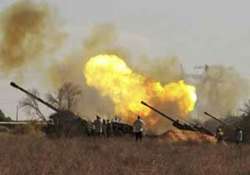NATO Extends Libya Mission By 90 Days
Brussels, Sep 22: NATO's decision-making body granted approval on Wednesday for the military alliance to continue its mission over Libya for another 90 days.Libya's former leader, Moammar Gadhafi, has fallen from power but pockets of

Brussels, Sep 22: NATO's decision-making body granted approval on Wednesday for the military alliance to continue its mission over Libya for another 90 days.
Libya's former leader, Moammar Gadhafi, has fallen from power but pockets of loyalist resistance remain.
NATO took over command of the mission in March, enforcing a U.N. resolution allowing the imposition of a no-fly zone and action to protect civilians.
Some observers have said NATO's actions, which have included daily bombing runs over the North African country, were more robust than envisioned in the resolution and amounted to supporting the rebels in a civil war.
But NATO Secretary-General Anders Fogh Rasmussen defended the operation in a statement Wednesday."Together with our partners, NATO has been remarkably successful in fulfilling the mandate of the United Nations," he said.
"But while threats to civilians persist, we will continue to protect them under the mandate confirmed unanimously in U.N. Security Council Resolution 2009, and at the request of the National Transition Council."The council is forming Libya's new government.
The additional 90 days was approved Wednesday in Brussels by the North Atlantic Council, which is composed of representatives from NATO's 28 member countries.
NATO took command of the operation in March and extended it for another 90 days in June. Without the new extension, permission for the operation would have expired Sept. 27.Fogh Rasmussen said the mission would be under constant review and could end at any time.
"This decision sends a clear message to the Libyan people: We will be there for as long as necessary, but not a day longer, while you take your future in your hands to ensure a safe transition to the new Libya," he said.
Meanwhile, the U.S. ambassador to Libya returned to Tripoli on Wednesday to lead a newly reopened American Embassy in a post-Moammar Gadhafi era.
Ambassador Gene Cretz arrived in Tripoli, a day before plans to raise the U.S. flag over the embassy building in the Libyan capital. I
t was about eight months after he left for consultations in Washington in January after WikiLeaks posted his opinions of Gadhafi's personal life and habits in a classified 2009 diplomatic cable.
At the time, the Obama administration was considering replacing him due in part to strains in ties caused by the blunt assessment.
Cretz returns to a country much changed since revolutionary forces seized control of Tripoli and forced the authoritarian leader into hiding after an uprising that began in mid-February.
Cretz was nominated to be the first U.S. ambassador to Libya in 36 years by President George W. Bush in July 2007 after a remarkable turnaround in U.S. relations with the North African nation.
The seismic shift in relations followed Gadhafi's 2003 renunciation of weapons of mass destruction and payment of compensation to the families of victims of 1980s terror attacks, including the bombing of PanAm 103 blamed on Libyan agents.
Cretz had kept a relatively low profile in Libya until November, when WikiLeaks posted his assessments of Gadhafi's personal life and habits in a classified 2009 diplomatic cable.
The secret document said Gadhafi "appears to have an intense dislike or fear of staying on upper floors, reportedly prefers not to fly over water, and seems to enjoy horse racing and flamenco dancing." It also discussed Gadhafi's longtime reliance on a Ukrainian nurse named Galyna who the cable said had been described as a "voluptuous blonde."
President Barack Obama announced Tuesday that the ambassador would return, telling Libyans: "This is your chance. And today the world is saying, with one unmistakable voice, we will stand with you."
The United States launched the military air campaign that helped rout Gadhafi's forces after the U.N. Security Council passed a resolution in March authorizing a no-fly zone and approving all necessary steps needed to protect civilians. NATO later took charge. AP